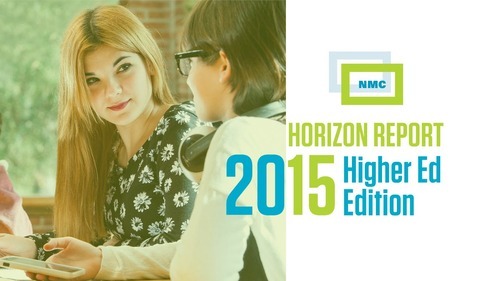On the 11th February NMC officially released the 2015 Higher Education edition of the Horizon Report.

Commissioned by the New Media Consortium (NMC) in collaboration with the EDUCAUSE Learning Initiative (ELI), this annual publication is widely referred to in the field of learning technology and education as a leading source for depicting potential future trends. This year’s publication marks the 12th anniversary of the Higher Education edition of the report; other published editions as part of the Horizon series include the K-12 edition and the Museum edition.
The report itself is broken down into three main sections; key trends, significant challenges and important developments. Each of these areas are further categorised as part of the report, for example trends can be either short-term, mid-term or long-term.
As a comprehensive document it would be very hard to cover every aspect of the report in one blog post so for benefit of keeping it shortish we’ve selected a few topics from each category.
Key Trends:
Advancing Cultures of Change and Innovation: Basing approaches taken to innovation in education on agile startups, where technology acts as a catalyst for change, has been suggested in this years long term trends. This method highlights the need to adapt in an era of rapid technical development, something not all Universities are comfortable with. There is a definite need for policy change in this area; digital technologies that students use in their day to day should be seen as a catalyst.
Increasing Use of Blended Learning: The development of new tools that can be used for education will enhance the options that are available for use in online learning and increase use as a result. Traditional face-to-face courses are complemented with online learning as students require more accessible means to access learning content away from classroom interactions. Increased use of blended learning solutions requires concrete guidelines which has implications for policy and leadership.
Significant Challenges:
Improving Digital Literacy: The ability to understand digital tools and information is seen as a significant challenge in this years report, not least because there seems to be a lack of consensus as to what constitutes as ‘digital literacy’ across many colleges and universities. Suggested as being an iterative process to accommodate for range of tools and evolving methods of use, this challenge has been defined as solvable.
Rewarding Teaching: With research so high on the agenda in Universities implementation of effective pedagogies for teaching are lacking. The REF has put greater pressure on teachers to be publishing research, meaning a reliance on part time teachers to cover taught sessions. This “Wicked Challenge” (Those that are complex to even define, much less address) suggests methods of teaching and quality of instruction need to be at the forefront.
Important Developments:
Bring Your Own Device: A widely used term, BYOD refers to when people bring their own equipment to their learning or work environment. Links between productivity and personal device usage have been documented, not least because users are already accustomed to working with their own laptop, phone or tablet. Personalised content and individual settings can be assigned to each device, again making them easier to use for study or work. Sufficient infrastructure and policies should be in place to support people who wish to use their own devices at University. Flexible workspaces that allow for personal devices to aid study should also be taken into consideration.
Flipped Classroom: The flipped classroom is a model of learning whereby the time spent in a class environment is dedicated to more active cognitive learning, time away from the class is spent learning through podcasts, videos and associated materials. This method shifts the ownership of learning from the instructors to the students and has proved popular in HE. The flipped classroom can be implemented at various scales and has a reported adoption time of one year or less according to the horizon report.
How these topics evolve over the coming year will be interesting to observe, especially from the perspective of policy and leadership in these areas. Further topics from the report were debated in an earlier post this year for those wishing to look at some additional key trends.
The Horizon report is published annually and individuals are recommended to get involved using the projects wiki page – http://horizon.wiki.nmc.org/
